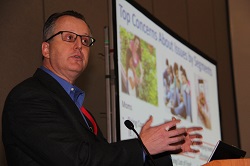 Despite knowing there is risk in digging, a recent poll conducted by Enbridge Energy Partners shows over 70 percent of farmers and ranchers have never called 811 to have pipelines marked before beginning a digging project, putting themselves and their operation at risk.
Despite knowing there is risk in digging, a recent poll conducted by Enbridge Energy Partners shows over 70 percent of farmers and ranchers have never called 811 to have pipelines marked before beginning a digging project, putting themselves and their operation at risk.
The survey suggests misconceptions about the 811 service discourage farmers from making the call. For example, two-thirds of farmers were aware of the 811 service, which marks pipelines on property. Of those who did know about the service, more than half didn’t know the call is free and provides pipeline markings that are valid for up to three weeks.
Survey data suggests farmers are aware of the risks associated with hitting buried lines, specifically the potential to ignite oil or gas released from pipelines and put operations and lives at risk, yet only 29 percent of polled farmers have ever used the service. Of those, less than half always use it.
“I was raised on a farm, and I know that farmers know their land well,” said Kesley Tweed, partnerships and public awareness manager for Enbridge. “However, I also know farmers want to make sure they’re doing everything they can to protect their family and employees. This survey showed us there are definitely some misconceptions about pipelines and the 811 service that we hope to clear up so farmers and others can work safely around pipelines.”
“I found this poll eye opening,” said Brad Shamla, vice president of U.S. Liquids Pipelines Operations. “We hope that by clearing up misperceptions, farmers along our pipelines will understand the importance and take a few minutes to call 811, have lines marked, and play it safe — for the safety of the community and the well-being of the operation.”
Among the common misperceptions, a majority (64 percent) were unaware that lines can be as shallow as 18 inches or less. (The depth of pipelines can vary due to erosion, digging projects and other factors.) Lines can be marked one-to-three days after the initial call and markings are valid for up to three weeks.
Visit call811.com for more information.












